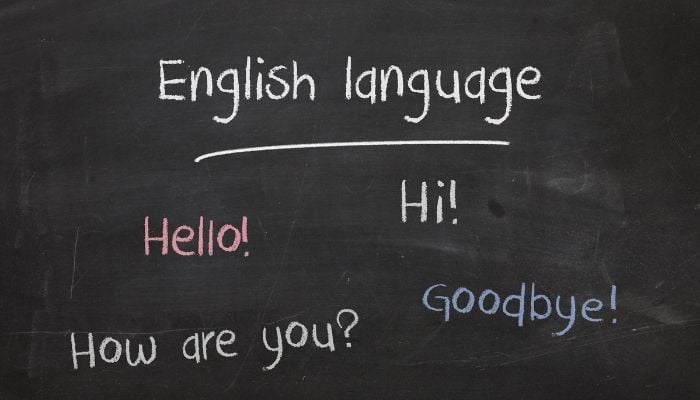The language barrier in classrooms in Pakistan
Many Urdu-medium government schools are also offering lessons in English which are poorly taught
February 03, 2022

Imagine sitting in a classroom where students who know only English or Urdu cannot understand the learning material – suppose that the lecture is in Portuguese or Swahili. This is what is happening in our schools and now even colleges. Young children beginning primary school are taught in English at various English-medium schools set up in the private sector and are also expected to learn in English.
Many Urdu-medium government schools are also offering lessons in English which are so poorly taught that the graduates of these schools – even at the university level where English is the medium of instruction – are not able to understand the language as compared with students in lower classes in private schools. According to teachers and academics, in Pakistan, it takes a university student around seven to eight hours to read the same text that a native English speaker would read in one hour.
This is true for primary school children who struggle for over two or three hours to read a lesson, which, in an elite private school where English is the medium of instruction, would be read in under 30 minutes by a student. This is a major problem and means that children simply cannot comprehend what they are learning and are therefore forced to adopt rote learning as the only method of passing examinations – writing down sentences and phrases they do not understand but have memorised.
The current situation should be compared with that in the rest of the world. Today, there is a huge emphasis on learning the English language which has dominated the world, and China, among other nations, has been extremely eager to push forward its levels of English learning. But in China, schools teach the first English lesson from Grade 3.
In Russia, it begins a little later when a child is usually nine to 10 years old. The choice of studying a second language other than Russian in which education is primarily conducted is also offered with French and German usually ending up being the most common choices. In India, English learning formally begins at Grade 3, although there are many parents who place their children in tuition centres to teach them the language as early as possible. It is worth mentioning that the language is usually not spoken in their homes or communities.
The results of this are essentially disastrous. Pakistan-origin professors who teach at the most prestigious universities on the globe say that the lack of understanding means that children can simply not progress intellectually. The language barrier makes it difficult for them to learn, and, consequently, extremely bored by the lessons, they must learn by rote. If they are taught science in Urdu or a language they understand well, there is a much greater chance that interest in the lessons would be built and progress made through the ranks.
This problem with our education system is possibly one of the reasons Pakistan lags far behind the rest of the world even in subjects like mathematics where language is not such a primary requirement. However, because of poor levels of teaching and the inability to develop curiosity among children, top universities in the US, rarely have Pakistani teachers in the Mathematics department. In contrast, there are many Indians who are part of the faculties of mathematics as well as in other areas of science at top universities. While Pakistan has some theoretic physicists who teach at the world’s top universities, their number is far too limited.
And the same can be said of the humanities, which are regarded as second-grade subjects and also depend greatly on the ability to understand the language in which they are being taught. It is almost impossible to study subjects like history, sociology, politics, philosophy or English Literature at a higher level if students are not able to understand the language in which they are being taught in the first place.
Yet at universities, professors teach their lessons in English, sometimes resorting to limited translations because they realise that students are unable to comprehend what is being taught. This, in other words, is an academic disaster. It affects both young and older students who must try and cope with university learning in a language which is almost entirely alien to them and taught by teachers who have few skills in teaching it as a second language.
The result is that privilege comes into play at an even larger level than would ordinarily be the case in a society that is deeply divided and stratified on the basis of class and wealth. While children from privileged families attend schools and are members of families where English is widely spoken and used, their counterparts in other households have little hope of finding jobs because they are unable to fully master the language even after college or university – it doesn’t matter how intelligent or how apt they may be in terms of the understanding of their subject.
The privileged then get an extra boost; the underprivileged are pushed still deeper into the mire. There are students at private and public universities who discover, as they move through the ranks, that their efforts to get accepted in a university means nothing at all, given that their status in society and their lack of English speaking and writing skills will mean that they cannot land better jobs and instead, are destined to do jobs at the middle or lower levels.
The lack of contacts or the status their families maintain in society also has an impact. A child of the people who are well connected and have influence in various ranks will find a job even if s/he is not skilled. The child of a driver, even if s/he is one of the best students at a top university, is unlikely to find a high-paying top-level job simply because his/her parents have no connections and no hope for giving him/her the push that s/he deserves.
This is a problem we need to cope with. It is more important than the Single National Curriculum which has gained so much attention. We need to even out the learning patterns of the country and then deal with the issue of privilege, which in some ways is connected with the English language. We also need to ensure that children feel less burdened by their studies and that they enjoy and understand what they are learning, preferably in their own languages, so that they develop the curiosity and interest which will drive them forward.
If we fail in this, we fail in producing scholars and academics of any standing. The problem is massive, given that the majority of our population is young and under 30 years of age. The bulk rate is still in education if it has managed to retain education beyond the secondary level. The issue of language has to be dealt with on top priority, followed by the other problems encountered by those in education institutions across the country.
Email: [email protected]









